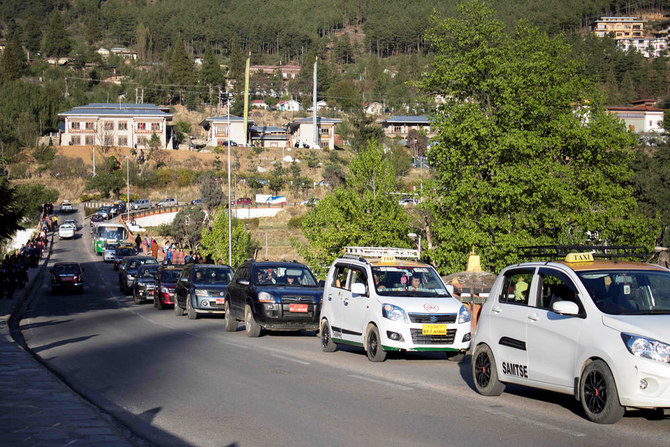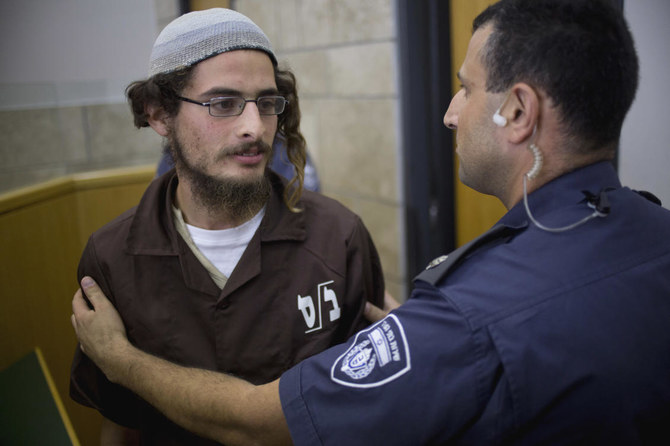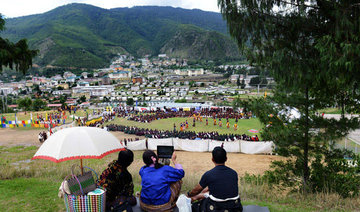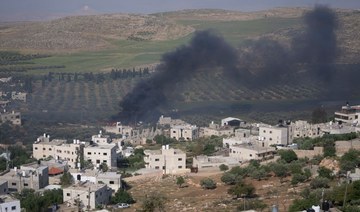THUMPHU: Famed for valuing Gross National Happiness over economic growth, Bhutan is a poster child for sustainable development.
But booming car sales may impact efforts to preserve its rare status as a carbon negative country — and an increase in traffic is testing the good humor of its citizens.
Bhutan has seen a more than five-fold increase in cars, buses and trucks on its roads in the past two decades, according to transport authority director general Pemba Wangchuk with capital Thimphu hardest hit by the influx of vehicles.
Phuntsho Wangdi, a media consultant, says the congestion and lack of parking now makes driving stressful in the tiny Himalayan kingdom where there are no traffic lights.
“I wish there were fewer cars. It wasn’t like this before,” he adds of life in Thimpu, which is home to half the cars in the country.
The nation’s economy has grown 7.5 percent each year in the past decade, according to the World Bank. Officials estimate there is now one car for every seven people in Bhutan, which has a total population of 750,000.
But the nation’s narrow country lanes and outdated city roads can barely cope. A lack of infrastructure, along with poor driving etiquette — some simply leave their cars parked in the middle of the road — compounds the problem.
“Every year the number of cars and the number of people are increasing, and the roads have remained the same, and it’s a problem for us,” Lhendup, a taxi driver, tells AFP.
Morning rush hour journeys that once took five minutes now take more than half an hour.
This may seem a small figure compared to the hours of gridlock faced by commuters in Manila, Jakarta, and Bangkok, but it is a step-change for the Bhutanese who say the situation has rapidly deteriorated in the past year.
“Its chaotic. I eat my breakfast in the car now to save time,” says Kuenzang Choden, who drops her four-year-old daughter at school every day before heading to work.
The traffic jams are a sign of the wider economic changes the nation is facing. Bhutan is renowned for prioritizing Gross National Happiness over GDP, and has captured tourists’ imagination as a tranquil, idyllic land, but there are signs of malcontent.
According to the World Bank’s 2018 report, the youth unemployment rate is high, as is rural to urban migration, which puts a strain on the resources of towns and cities. And despite it’s reputation as a place where well-being is prioritized — it ranked 95th out of 156 countries in the 2019 UN World Happiness Report.
The proliferation of the Internet and smartphones are fueling modern desires, while dealers are filling their showrooms with new brands and models from Japan and South Korea to lure buyers.
And while taxes have increased and restrictions put on vehicle loans, car buyers are not discouraged.
Local financial institutions gave 3.2 billion ngultrum ($46 million) in car loans in 2015, but by last year the amount had reached 6.7 billion ngultrum ($96 million).
The figures please local businessmen but worry environmentalists keen to ensure Bhutan remains one of the world’s greenest countries.
Environmental activist Yeshey Dorji explains: “As a nation that prides itself on being a carbon-negative country, the increase in the number of fossil fuel vehicles speaks poorly of our leadership position in environmental conservation.”
Bhutan and Suriname, both with lush forests, are the only two countries to claim they are carbon negative, absorbing more carbon pollution than they give off.
Methane from cows, the burning of crops and other farm activities used to be Bhutan’s main source of greenhouse gases. But that has changed in recent years to industry and cars.
Bhutan’s constitution dictates that at least 60 percent of the country must be forest and the figure is currently above 70 percent.
But Bhutan is now importing more in fossil fuels than it exports in hydropower to India — the country’s biggest revenue earner.
Public transport is poor, particularly in Thimpu, which is home to 100,000 people but barely 40 buses.
The capital’s mayor Kinlay Dorji plans to introduce bus-only lanes on city roads and wants to buy more buses.
“Its time for radical measures,” he says.
“We have to make public transport more attractive and discourage owning cars,” he adds, warning that unless action was taken Thimphu risked grinding to a standstill.
To ease congestion, the city is also constructing its first two multi-story car parks that will each take about 600 cars.
The National Environment Commission insists Bhutan is still carbon negative despite the traffic jams and vehicle boom, but wants to stop things worsening.
Commission secretary Dasho Sonam P. Wangdi explains: “We cannot stop people from buying cars, but we can introduce alternative, less polluting cars such as the hybrid and electric ones to reduce carbon footprint.”
Car boom brings gridlock misery to ‘green and happy’ Bhutan
Car boom brings gridlock misery to ‘green and happy’ Bhutan

- Bhutan has seen a more than five-fold increase in cars, buses and trucks on its roads in the past two decades
- Congestion and lack of parking now makes driving stressful in the tiny Himalayan kingdom where there are no traffic light
US sanctions fundraisers for extremist West Bank settlers who commit violence against Palestinians

- Announcement comes as West Bank sees some of its worst violence perpetrated by extremist settlers against Palestinians since Gaza war
WASHINGTON: The Biden administration on Friday imposed sanctions on two entities accused of fundraising for extremist Israel settlers already sanctioned, as well as the founder of an organization whose members regularly assault Palestinians.
The Treasury Department announcement comes as the West Bank has seen some of its worst violence perpetrated by extremist settlers against Palestinians since the war in nearby Gaza began.
There is also friction between President Joe Biden and Israeli Prime Minister Benjamin Netanyahu, whose far-right government has reacted angrily to previous sanctions imposed against West Bank settlers.
Included in the Friday sanctions are two entities — Mount Hebron Fund and Shlom Asiraich — accused of raising funds for sanctioned settlers Yinon Levi and David Chai Chasdai.
Both men were previously sanctioned by the Biden administration for violently attacking Palestinians in the West Bank.
The penalties aim to block them from using the US financial system and bar American citizens from dealing with them.
The fundraising campaign established by Mount Hebron Fund for Levi and by Shlom Asiraich for Chasdai generated the equivalent of $140,000 and $31,000, respectively, according to US Treasury.
In Levi’s case, the fund now sanctioned by the Biden administration is linked to the regional council in the area, a body that receives state money. The Biden order Friday stopped short of sanctioning the council itself.
Rights groups say that the expansion of illegal settler outposts in the West Bank is enthusiastically supported by the regional councils and nudged along by Israel’s current national government — the most far-right in the country’s history.
The Biden order also skirted sanctioning crowdfunding websites where funds were raised, GiveChak and New York-based Charidy.
In Chasdai’s case, the fundraiser on Charidy was organized by Shlom Asiraich, which raises money for imprisoned Jewish extremists.
Both online fundraisers have now been taken down. But at least one fundraiser linked to a settler previously sanctioned by the Biden administration, Moshe Sharvit, remains online. As of Friday, the page on GiveChak had raised the equivalent of over $879,000.
Additionally, the State Department is designating Ben-Zion Gopstein, the founder and leader of Lehava, an organization whose members have assaulted Palestinian civilians.
Treasury Deputy Secretary Wally Adeyemo said the organizations “undermine the peace, security, and stability of the West Bank. We will continue to use our tools to hold those responsible accountable.”
In February, Biden issued an executive order that targets Israeli settlers in the West Bank who have been accused of attacking Palestinians and Israeli peace activists in the occupied territory.
Hindu-Muslim divisions sway voting in Indian district scarred by deadly riots

- Villages are largely self-segregated by religion in and around Muzaffarnagar in the most populous Uttar Pradesh state
- Violent clashes broke out in 2013 after two Hindus stabbed Muslim youth to death, accusing him of harassing their sister
MUZAFFARNAGAR: Hindu-Muslim enmity made way for peace in an Indian district that saw deadly riots a decade ago but religious divisions still influence residents who voted on Friday in general elections in which Hindu nationalism is a key theme.
Villages are largely self-segregated by religion in and around Muzaffarnagar district, in the most populous northern state of Uttar Pradesh, but people say there is no longer tension between the majority Hindu and minority Muslim communities.
Violent clashes broke out here in 2013 after two Hindus stabbed a Muslim youth to death, accusing him of sexually harassing their sister. They were later beaten to death by a Muslim mob, which sparked riots that killed about 65 people, mostly Muslims, and displaced thousands.
Violence has not returned to the district known as the country's sugarcane-belt, but political divisions remain as Hindus typically vote for Prime Minister Narendra Modi's Bharatiya Janata Party (BJP) and Muslims for the opposition.
Modi's government has "controlled Muslims", said Ramesh Chand, a Hindu biscuit baker in Kairana city near Muzaffarnagar.
Critics accuse the nationalist BJP of targeting India's 200 million minority Muslims to please their hardline Hindu base - charges they deny.
Modi is widely expected to win a third term on the back of strong growth, welfare and his personal popularity despite some concern about unemployment, price rises and rural distress.
Chand said Modi had improved security in the region. "We can live in peace, whether or not we have jobs ... We can sleep with our doors open."
There were opposing views too.
In Jaula village, sugarcane farmer Mohammed Irfan, 50, said Modi's "high-handedness against Muslims" as well as unemployment and inflation were major reasons for him voting for the opposition Samajwadi Party.
Uttar Pradesh elects 80 lawmakers to the 543-member lower house of parliament, the most among all states, and a strong showing here is critical to the nationwide outcome.
Support for Modi was visible in Kutba Kutbi village, the epicentre of the 2013 riots.
Although there is "brotherhood" between the two communities now, nearly all Muslim families left the village after the riots, said Vinay Kumar Baliyan, 43, a farmer who said he supports Modi for promoting economic growth and raising India's stature globally.
But Irfan said Muslims are expected to vote in larger numbers this time as Eid celebrations this month brought many migrant workers and students home.
After Pakistan alert, WHO likely to issue wider warning on contaminated J&J cough syrup

- The UN health body said it puts out global medical product alerts to ‘encourage diligence’ by authorities
- The WHO this week sent out alert on five batches of contaminated cough syrup ingredients found in Pakistan
LONDON: The World Health Organization is likely to issue a wider warning about contaminated Johnson and Johnson-made children’s cough syrup found in Nigeria last week, it said in an email.
Nigeria’s regulator recalled a batch of Benylin paediatric syrup last Wednesday, having found a high level of diethylene glycol in the product during routine testing.
The contaminant, alongside another closely related toxin, ethylene glycol, has been linked to the deaths of more than 300 children in Cameroon, Gambia, Indonesia and Uzbekistan since 2022, though there is no evidence that these incidents are linked with the latest recalls.
The UN health body said it puts out global medical product alerts to “encourage diligence” by national authorities and was likely to do so in this instance, “subject to confirmation of certain details from parties.”
The recalled batch of Benylin syrup was made by J&J in South Africa in May 2021, although Kenvue now owns the brand after a spin-off from J&J last year.
J&J has referred requests for comment to Kenvue. In an emailed statement on Friday, Kenvue said it had carried out tests on the batch recalled by Nigeria and had not detected either diethylene or ethylene glycol.
“We continue to work closely with health authorities and the WHO and are engaging with NAFDAC to understand their test results, including verifying the authenticity of the sampled product, the testing methodology used, and results reported by the agency,” the statement added.
Since Nigeria’s recall, five other African countries have also pulled the product from shelves — Kenya, Rwanda, Tanzania, Zimbabwe and South Africa, where the drug was made.
South Africa’s regulator has also recalled another batch of the syrup, which is used to treat coughs, hay fever and other allergic reactions in children.
Diethylene glycol is toxic to humans when consumed and can result in acute kidney failure, although there have been no reports of harm in the latest incident.
RAW MATERIALS
In the 2022 cases, the contamination in the syrups came from the raw materials used by manufacturers in India and Indonesia.
The WHO said it was collaborating with both the manufacturer and regulatory authority in South Africa to investigate the Benylin paediatric syrup, and had information on the source of the ingredients used. Kenvue has previously said it tested its ingredients before manufacture.
The agency said the possibility that the syrup was counterfeit was also “under consideration as part of investigations.”
Earlier this week the WHO sent out a separate alert on five batches of contaminated cough syrup ingredients found in Pakistan that appeared to have been falsely labelled as Dow Chemical products.
It was the first alert the WHO has sent on excipients — elements of a medicine other than the active pharmaceutical ingredient — rather than finished products, the agency confirmed on Friday.
The batches of propylene glycol were contaminated with ethylene glycol.
“It was critical for WHO to also alert manufacturers that may have been procuring this material to exercise more caution,” a WHO spokesperson said by email.
Propylene glycol is not an ingredient in Benylin paediatric syrup, a Kenvue spokesperson said on Friday.
Polish flag carrier LOT cancels Friday flights to Tel Aviv and Beirut, PAP reports

- Decisions about future flights would be made on an ongoing basis
WARSAW: Polish national airline LOT canceled flights on Friday to Tel Aviv and Beirut due to the unstable situation in the region, a spokesperson was quoted as saying by state news agency PAP.
“Today’s flight 151/152 to Israel from Warsaw and to Beirut 143/144 have been canceled,” Krzysztof Moczulski told PAP. He said decisions about future flights would be made on an ongoing basis.
French police arrest man who threatened to blow himself up at Iran’s Paris consulate

- Police verifying man’s identity and trying to determine whether he had weapons
PARIS: A man who had threatened to blow himself up at Iran’s consulate in Paris was arrested by police, a police source said.
French police earlier cordoned off the Iranian consulate, Reuters reporters saw, and did not immediately confirm finding any weapons.
A police source told Reuters the man was seen at about 11 am (0900 GMT) entering the consulate, carrying what appeared to be a grenade and explosive vest.
A Paris police official told The Associated Press that officers were verifying the man’s identity and trying to determine whether he had weapons.
Police earlier said they were at the scene and asked the public to avoid the area but provided no further details.
Service was interrupted on a nearby metro line for security reasons, the RATP metro company said.
A police cordon remained in place on Friday afternoon, but traffic was resuming in the area.
A person at the Iranian embassy who responded to a call from Reuters declined to provide any information on the situation.
It was unclear whether the incident had any link to the escalating tensions between Iran and Israel.
Earlier on Friday, explosions echoed over the Iranian city of Isfahan in what sources described as an Israeli attack, but Tehran played down the incident and indicated it had no plans for retaliation — a response that appeared gauged toward averting region-wide war.
The incident also comes as Paris is gearing up to host the summer Olympics.
* With Reuters and AP


















